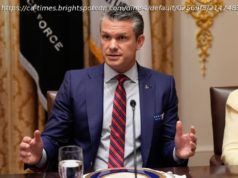The case of Jamal Khashoggi is an incident “beyond imagination.”
The disappearance and possible murder of Jamal Khashoggi, the Saudi journalist and dissident, has brought sharp attention to Saudi-U. S. relations. On Thursday, President Donald Trump told Fox & Friends that Khashoggi “went in [to the Saudi consulate in Istanbul, Turkey] and it doesn’t look like he came out.” That itself is a marked departure from the Saudi line that he had left the facility that he entered October 2 in order to obtain paperwork needed to get married. In an interview Wednesday on Fox, Trump ruled out cutting off arms sales to Saudi Arabia over the fate of Khashoggi, who divided his time among Virginia, London, and Istanbul. Trump said Saudi arms sales were helping the U. S. economy and cutting them off “would be a very, very tough pill to swallow for our country.”
Read: What happened to Jamal Khashoggi?
Saudi-U. S. relations have been steadfast for decades, particularly in the Trump era, as the kingdom has remained a reliable source of oil and stability in another otherwise restive region. There were disagreements, of course, especially over U. S. support for Israel. But the two countries saw a common foe first in communism, then in Iran, and more recently in radical Islam. Relations suffered after the attacks of September 11, in which 15 of the 19 hijackers were Saudi citizens.
The disappearance of Khashoggi is “as big a crisis for U. S.-Saudi relations as 9/11 was,” Simon Henderson, an expert on the Gulf and energy policy at the Washington Institute, told me. “The nature of [that] crisis was about perceived Saudi support for extremism, but the saving grace was that the 15 Saudis among the 19 hijackers were opponents of the house of Saud,” he said. “The situation today, as far as we can tell, is that the people involved in the disappearance, if not the murder of Jamal Khashoggi, were employees of the Saudi government, and it was a scheme hatched by the Saudi government, and organized by the Saudi government.”
But so far there are few clues about what the Trump administration will do about it. It is also unclear what the United States knew about Khashoggi’s fate and when it knew it. The Washington Post reported Wednesday that U. S. intelligence had learned that Saudi Crown Prince Mohammed bin Salman, known as MbS, ordered an operation to lure Khashoggi, who also wrote for The Washington Post, back to Saudi Arabia. It is unclear whether the Trump administration warned Khashoggi, a U. S. resident, of the plan. According to a directive issued in 2015, intelligence agencies “have a duty” to warn people who might be in danger. Robert Palladino, a U. S. State Department spokesman, said there was no “advance knowledge” of any danger to the journalist.
Indeed, as I wrote Wednesday, the Saudi Arabia for which MbS has become the public face in the West is in many ways more repressive than in past years—despite the unveiling of broad reforms. MbS may want to modernize, but he also does not seem to want dissent. “My working assumption is that MbS was somehow personally offended by Jamal [Khashoggi] and said the equivalent of, ‘Who will rid me of this turbulent priest?’” Henderson told me. “And MbS is surrounded by people who will do exactly that.”
After its initial silence, the White House said Wednesday that John Bolton, the national-security adviser, and Jared Kushner, the president’s son-in-law and senior adviser, spoke to MbS about Khashoggi, as did Mike Pompeo, the secretary of state. “In both calls they asked for more details and for the Saudi government to be transparent in the investigation process,” a White House statement said.
There also has been more active involvement from congress. On Wednesday, a bipartisan group of senators wrote to Trump to trigger the Global Magnitsky Act, which gives the president 120 days to decide whether to impose sanctions on anyone involved with Khashoggi’s disappearance. (A Turkish newspaper published images of 15 Saudi officials it says traveled to Istanbul and ultimately killed Khashoggi.) The letter’s signers included Senators Bob Corker, Republican of Tennessee, and Robert Menendez, Democrat of New Jersey, the chairman and ranking member, respectively, of the Senate Foreign Relations Committee. Senators Lindsey Graham, Republican of South Carolina, and Patrick Leahy, Democrat of Vermont, the chairman and ranking member, respectively, of the Senate Appropriations Subcommittee on State, Foreign Operations, and Related Programs, also signed it.
“What’s so extraordinary about this is that everybody realizes this is almost certainly going to have a huge aspect on the bilateral relationship,” Henderson told me. “It’s difficult because of the very nature of what appears to have happened.… The incident itself is beyond imagination and the consequences are beyond imagination.”
When Trump took office, he was keen to reset relations with the Saudis. They had been d amaged during the Obama years for, among other things, the multilateral nuclear agreement with Iran and his administration’s support of the Arab Spring. A s a May 2017 note from Brian Hook, who was at the time director of policy planning at the U. S. State Department (and who now heads the U. S. effort against Iran), to Rex Tillerson, Trump’s first secretary of state, said of U. S. ties to allies like Saudi Arabia: “[T]he Administration is fully justified in emphasizing good relations for a variety of important reasons, including counter-terrorism, and in honestly facing up to the difficult tradeoffs with regard to human rights.” (The note was first reported on in December 2017 by Politico .)
Saudi Arabia was the destination of Trump’s first foreign trip as president, a visit best remembered for his announcement of billions of dollars in Saudi investment in the United States, and that orb. The visit was meant not only to reset relations that had been badly strained during the Obama years, but also to highlight Saudi Arabia’s value to the ne w administration: as arguably the most important Muslim country in the world, as a major purchaser of U. S. weapons and other products, and as a bulwark, along with Israel, against Iran’s growing regional influence. (It surely helped that the Saudi-led Arab states, along with Israel, were the most vocal opponents of the Obama-era nuclear agreement with Iran, an accord Trump withdrew from in May.) Soon after that visit, the Saudis and its Arab allies embarked on an still going blockade of Qatar, an important U. S. ally in the region, for its alleged support of terrorism and other infractions.
The Trump administration also realized that any attempt by Washington to formulate a plan to bring peace between the Israelis and the Palestinians would likely need Saudi buy in. This is where the relationship between Kushner and MbS became pivotal. The two men were seen to be close and of the same mind when it came to deal-making and reform. (Except it hasn’t quite gone that way. The Palestinians have refused to participate in any talks after Trump moved the U. S.






